#dbt group
Text
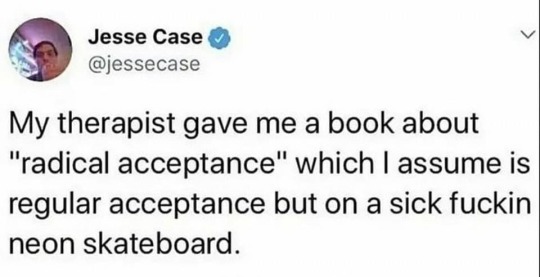
#memes#meme#funny memes#memesdaily#dank memes#dankest memes#memelove#funny images#funny post#lol#why am i like this lmfao#bpd problems#bpd meme#dbt group#dbt skills#skatergirl#mentally ill memes#lmao#therapy#eupd recovery#borderline recovery#being borderline#mental heath support#memesforyou#best memes#lolz#self deprecation#self deprecating thoughts#bpd blog#living with bpd
653 notes
·
View notes
Text

It’s over for you bitches. RODBT, here I come.
#mental health#actually bpd#bpd thoughts#living with borderline#bpd stuff#bpd feels#borderpolar#bpd mood#bpd problems#control#dbt#dbt group#dbt skills#dbt therapy#books and reading#booksbooksbooks#reading#self help#self love#self care#self improvement#self healing#be your authentic self
18 notes
·
View notes
Text
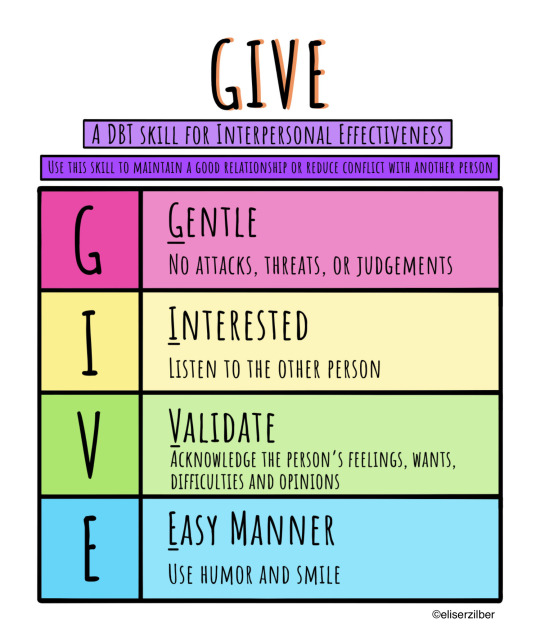
GIVE
Use this skill to maintain a good relationship and reduce conflict with another person.
G - Gentle: No attacks, threats or judgments.
I - Interested: Listen to the other person.
V - Validate: Acknowledge the person’s feelings, wants, difficulties and opinions.
E - Easy Manner: Use humor and smile.
*More DBT guides here*
#bpd life#borderline personality#borderline pd#borderline problems#bpd stuff#bpd problems#bpd thoughts#bpd fp#actually bpd#dbt group#dbt skills#dbt therapy#dialectical behavior therapy#communication skills#skill#give#give skill#gentle#listen#mindful#mindfulness#interpersonal skills#interpersonal effectiveness#interpersonal relationships#relationship#interpersonal communication#interpersonal relation#communication#resources#dbt
25 notes
·
View notes
Text
Hey I'm really curious about the experiences of those with BPD who have gone through different treatments and therapies.
TLDR: What has been the most helpful treatment for you as a person diagnosed with BPD? What hasn't been helpful?
I was diagnosed with BPD a few months ago. For more context, I am also in the process of getting an autism diagnosis, and in the past I have been diagnosed with anxiety, depression, and sensory processing disorder. I have been through prolonged complex trauma throughout my life.
I was diagnosed with BPD in hospital, and once I got out of hospital, I began an outpatient group DBT program. I was really hopeful for this because I'd heard about how great it is.
However, once I began the program, I could tell this wasn't going to work. Every week, I spent more time being aware of the people around me than focusing on the content, and I always left feeling worse than when I started.
I could rarely remember the content, but when I could, it made no sense to me. I did the interpersonal affectiveness module and all of it just felt like masking to the max. None of it addressed or acknowledged the complex trauma I've been through, and it all felt like it was my fault that I'm like this, and I have to suck it up to work for other people, no matter how terrible it makes me feel.
Now I'm back in hospital again and I feel lost. I don't know what sort of treatment I'm supposed to be going for. CBT doesn't work, DBT doesn't work. I wonder if it's just because I'm autistic and DBT isn't neurodivergent friendly.
In any case, I really want to hear peoples experiences with BPD and therapy.
#actually bpd#bpd things#bpd thoughts#bpd problems#borderline personality disorder#borderline pd#personality disorder#cluster b#bpd#dbt skills#dbt therapy#dbt group#dbt#dialectical behavior therapy#c ptsd#cptsd recovery#autism#actually autistic
15 notes
·
View notes
Text
Rupture and repair is part of a healthy relationship.
But sometimes after a rupture, you can’t reconnect with them for whatever reason (e.g. rupture with an emotionally immature parent)
In those times, the second best you can do is to recognise the pain you feel and reconnect with yourself.
#ruptureandrepair#psychology#acceptance and commitment therapy#life quotes#life advice#relationships#poets on tumblr#conflict resolution#dbt therapy#dbt group#dbtr#motivation#feel better
112 notes
·
View notes
Text

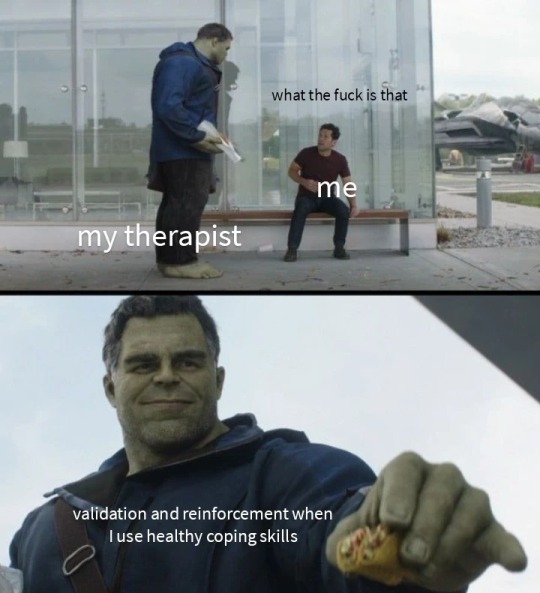


if i post dbt memes does it count as AC(ontribution)CEPTS
#idc im using this as an excuse to write that i used ACCEPTS on my diary card this week#dbt#dbtmemes#dialectical behavior therapy#dialectical thinking#therapy#therapy stuff#dbt group#therapy memes#mental illness#im not mentally stable#actually bpd#bpd struggles#bpd memes#mental illness memes
12 notes
·
View notes
Text
Emotional, Rational, Wise Mind
I came up with a little exercise for when the hellbrain is trying to spit lies at me and thought I'd share. When I'm in the middle of a fit, I often still have access to my logical mind, but can't break through to my wise mind, and I've found this helpful (2nd row omitted for possible triggering subject and names censored)
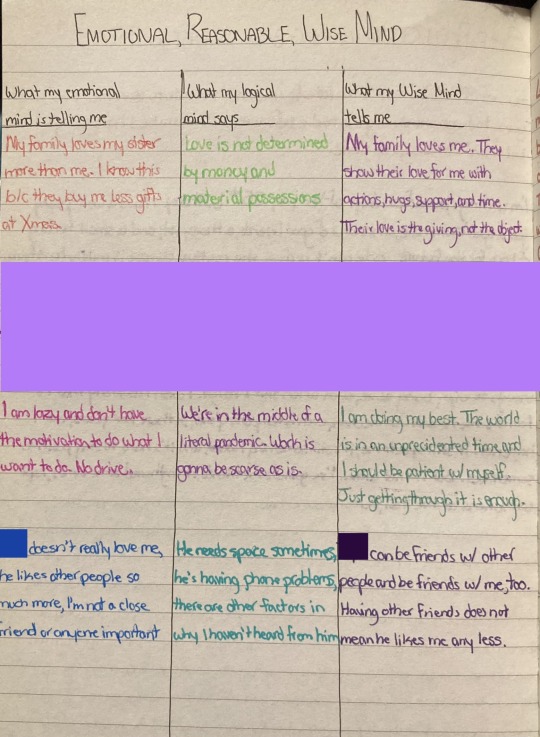
I typed up a version if anyone would like to give it a try. Don't be discouraged if you can't fill them out in quick succession. Identify the emotion, try to find reason, and evoke your wise mind. It is in there!

#treatment mall#dbt#dialectical behavioral therapy#dbt skills#dbt therapy#dbt group#mental health blog#mental health awareness#mental health positivity#mental health posting#journal prompt#dbt exercise#mental wellness#mental heath support#personality disorders#cluster a#cluster b#cluster c#personality disorder#bpd#ppd#spd#stpd#apd#hpd#npd#avpd#dpd#ocpd#mental health resources
49 notes
·
View notes
Text
So last night I kinda let emotion mind win. I battled back and forth with it, feeling as though I was “in control enough” to know what I was doing.
In lieu of that, I contacted my fp to spill out my feelings. I knew it was best not to, but I craved to be heard, acknowledged. I was doing my best to use skills and keep it brief and not all finger pointing - says my emotion mind lol.
I sent and unsent, typed and erased, messages as I grappled with what was right and wrong. It was hours of an emotional saga for me, talking myself on and off the ledge. I felt everything, I was crying, questioning the point of existence, wondered what it’d be like if I showed up to therapy tomorrow with my hair cut off, thought of breaking my ankle, all the damn things. So granted, I did and still could cut myself some slack. It was a lot to deal with and I just needed to be relieved.
BUT, when I woke up this morning, I was literally terrified to see what I would wake up to. Did he respond to the messages that remained? lol of course not, but who knows what the day will hold.
It honestly feels like waking up after a drunken night. I mean I’ve always known it, but for what feels like the first time I can FEEL the difference between emotion and wise mind (or at least my baseline). When I woke up my first thought was basically “oh yea crap, I did that….what did it cost me? Why girl why?!?”
I don’t know how to make any non-BPD person get it, but when I’m in that realm I’m truly not like myself. And I know it sounds like a cop out, but with emotions this big…there’s no way you can think. But the thing is, they’ll never get it.
#actually bpd#borderline blog#borderline personality disorder#bpd blog#actually borderline#bpd#actuallymentallyill#living with bpd#bpd feels#bpd awareness#black mental illness#bpd vent#bpd rant#bpd love#fp bpd#fav person#bpd rage#bpd mood#dbt skills#dbt group#bpd emotions
15 notes
·
View notes
Text
DBT really is helping nearly all our mental illnesses. It's crazy, we did not expect this at all.
Like, oh we're struggling to calm down from a crisis? TIP skill,
Someone just said something that upset us? STOP skill.
We're feeling really bad about ourselves? Mindfulness/ Non-judgemental thinking.
There's so much that we're able to be better with, and we know that if one skill doesn't work there's so many others that might. And of course it's not fool proof sometimes we can't use our skills or they just don't work, but that's okay.
Being able to have the resources to help ourselves is such a great feeling, once that we've only just learned.
We've got a long way to go but we're slowly learning how to be kinder to ourselves.
26 notes
·
View notes
Text
*In DBT Group*
Other patient: I didn’t do the homework.
Me: Just fucking lie idiot…
#bpd#mentally ill#mentally unwell#mentally fucked#living with bpd#bpd problems#bpd feels#bpd splitting#bpd mood#bpd blog#bpd thoughts#bpd shit#bpd stuff#bpd life#bpd meme#dbt skills#dbt therapy#dbt group#dbt#memes#funny#lol#group therapy#therapy
4 notes
·
View notes
Text
I miss my old group therapist. I was rereading old emails and ughh I wish I could go back. I feel like when I told her last year I was thinking of working in the field either at my old hospital or my current work place she said something like “we’ll have to talk about what that means if it happens”. I know that’s not the exact words but I got the feeling that it might be a problem for me to still be in group if in was working in the field more specifically my old hospital where my group is also located. I ended up leaving group before I ever got the job so now I don’t know what she meant.
I just looked back at an old email where she wrote “You know you can always come back, right?” So maybe there’s hope?
That was last Jan/Feb when I was talking about leaving group for the second time. I ended up leaving but I sent her a “long overdue update” in April but she never replied. Maybe it just slipped her mind, maybe she somehow never got it. Maybe she was mad. I don’t know.
My therapist doesn’t even know I’m thinking of group again…
I wish there was a group for working professionals in the mental health field.
4 notes
·
View notes
Text
Do I like DBT? Yeah.
Do I like all of the DBT acronyms? Hell No
#dbt#dbt skills#dbt group#OCD#mental health#Like Dear Man#Like What The Fuck That Is So Confusing#Or Fucking Please Master#THEY ARE BAD ACRONYMS IM SORRY
3 notes
·
View notes
Text
Muchas veces nos pasa que para poder avanzar tenemos que aprender a aceptar la realidad, por ello es que nos cuesta tanto dejar ir una mala relación, pese a que no te sientes feliz, que no te sientes acompañado, etc.....
Rompe el patrón suelta lo que te puede hacer daño.
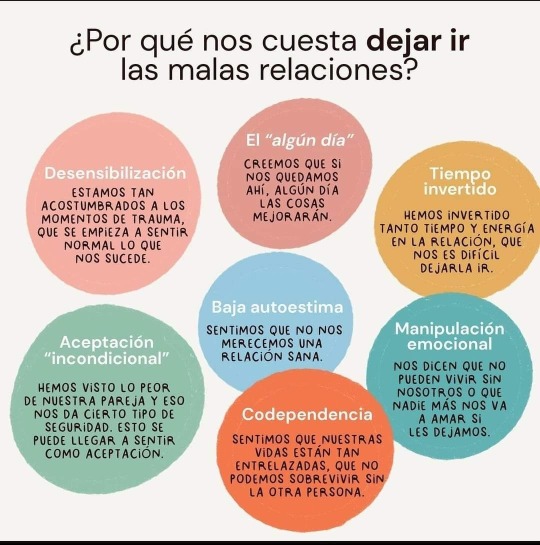
4 notes
·
View notes
Text
This post is to elaborate more on my experience in the DBT group and some of the reading and tools I found most helpful to me.
The DBT group I was able to take part in was a remote group that met once a week for 16 weeks via Webex. I was very lucky to get a spot and that my Medicaid covered any cost. It was run by two social workers as part of NYU Langone's Psychiatric Center at Sunset Terrace.
The weeks were broken down based on the 4 Modules (core skill groups) of DBT: Mindfulness, Distress Tolerance, Emotional Regulation, and Interpersonal Effectiveness.
Mindfulness: This is the base of any DBT practice, and what I always had trouble with in the past. Mindfulness is a kind of self-awareness that you can use to break down your experiences and give yourself a kind of reality check. Being mindful is being present and aware of your emotions, your body, and your though process.
There are 3 Minds with which we experience and react to the world: Emotion Mind (acting based on emotions alone), Rational Mind (acting based on facts alone), and Wise Mind (a combination of the first 2 and the goal of mindfulness).
Distress Tolerence: This module focuses on short term solutions for big emotions. The skills involved in this module are called Distraction skills because their goal is to just get you through the wave of emotion, resist any harmful urges, and survive your distress long enough to talk to someone or get to other skills.
There are quite a few skills in this module I found helpful, and I'll go into more detail on them in another post. The skill I think can do the most in the moment is called ACCEPTS, an acronym used to remember what you can do to distract yourself when feelings get too intense.
A - Activities: Watch a comforting tv show or movie, clean, do a puzzle, any task that requires most of your attention so you can focus mindfully on it rather than your emotional spiral.
C - Contributing: Talk to a friend or family member, help someone with a task like cooking or cleaning. The goal being to focus on being with someone rather than being alone in your thoughts. *This obviously would not be a go-to if the person would further trigger you.
C - Comparisons: Compare this emotional storm to a past, worse experience as a way to remind yourself that you've survived before, and you can do it again. *Again, the point of this is not to further trigger yourself, but to prove to yourself that you're strong enough to get through this moment of distress.
E - Emotions: Activate opposite emotions by watching a funny video or recalling a happy memory.
P - Push Away: Mentally push away the triggering thoughts or situation until you are calmer and more regulated and able to deal with the emotions. Commit, for a few minutes, to picturing your problems going into a small box, closing them in it, shoving the box deep in the back of a closet and closing the door. This exercise is a very short term way to remove the weight from your shoulders.
T - Thoughts: Actively think about something completely unrelated to your triggers. Sing your favorite song from memory, do a crossword puzzle or a math problem.
S - Sensations: Interact with your 5 senses mindfully; hug a stuffed animal or a pet, hold ice in your hand and feel it melt, lay flat on the floor and feel your body pressing into the hard surface.
**The best way to utilize this skill is, when you're calm and not feeling any distress, make yourself a list of specific things you can do that correspond with each of these steps. Thinking of something to distract you when you're in the midst of an emotional storm is incredibly hard, so preparing a reference guide for yourself ahead of time is a way to show up for yourself.
Emotion Regulation: This 3rd module focuses on learning to identify your emotions, understand where they come from and what they are trying to tell you, and processing them in a healthy way.
The purpose of all emotions is evolutionary survival. Emotions spur us into action to meet our needs (when you get hangry, you know you need to eat), and communicate danger to ourselves and others. Body language and voice tone can also often communicate emotions before words do.
*Use a feeling wheel to identify your emotions and dig deeper. If you can't process them right away, use a distress tolerance skill until you are able to sit with them.
*The best skill for emotion regulation is ABC PLEASE, an acronym used to help you recognize vulnerability factors in your life and minimize them.
Interpersonal Effectiveness: This last module focuses on skills that help us communicate with others. There are skills like GIVE, which can be used to maintain good relationships with others, and FAST, which can be used to help maintain your self-respect when making a request of someone.
*There are others that I will make graphics for, stay tuned!
Attending the group and learning the skills was only part of what I found helpful on my journey toward stability. I found a book, Mindfulness for Borderline Personality Disorder, that helped break mindfulness down in great detail and very easy to follow language. The book is written specifically for BPD-havers so it's really an excellent resource. The other tool I found helpful is something my therapist suggested I get, The Game of Real Life, which is a game that you can play to learn DBT skills in an interactive and fun way. It comes with a little book that breaks every skill and practice down, Skill cards which I find to be a great go-to for recalling a skill in a moment you need it (after all, it's a whole lot of acronyms to remember), and Conflict cards that give you examples of situations you might experience, and you have to pick a skill card to practice (can be done alone but better with someone you trust to really dive into the communication and regulation skills). I've actually been carrying a few of the skill cards in my purse wherever I go, just in case I need a quick reference in a moment of distress.
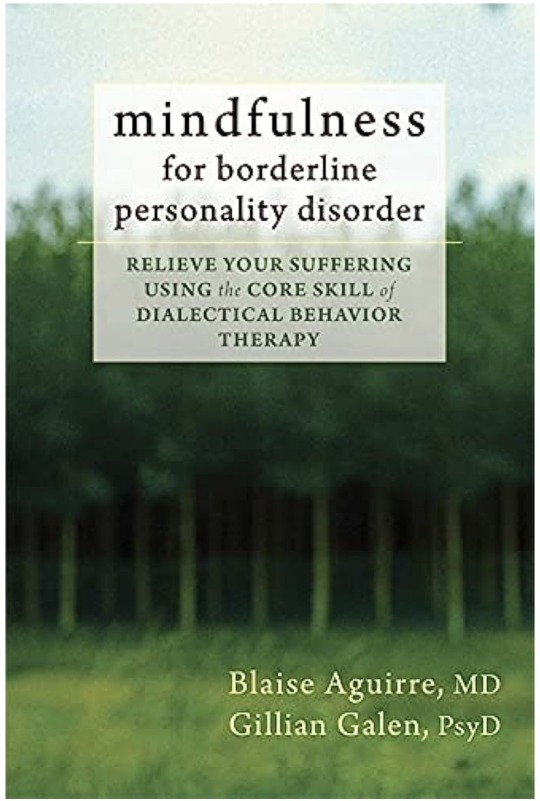
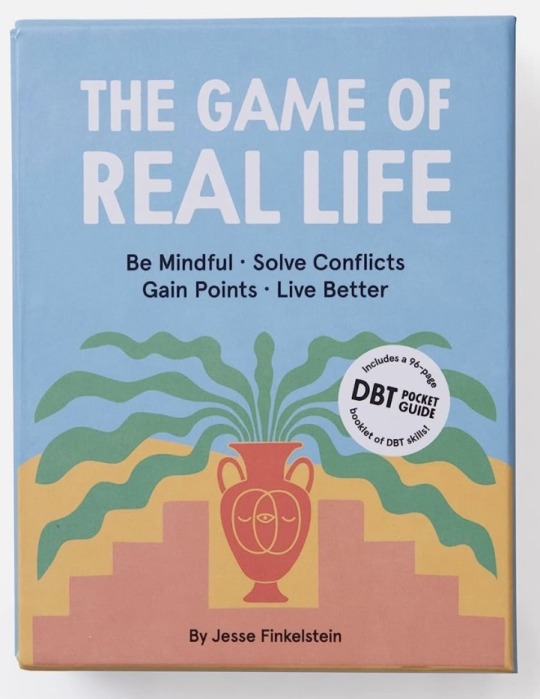
I have so much more to share with anyone who's interested. I'll keep posting, making graphics, and if anyone has a specific question about any of the modules, I'll do my best to answer or help you find the information online. DBT groups are super hard to find, in extremely high demand so it's hard to get in, and usually grossly expensive due to this country's horrible healthcare system. I consider myself extremely privileged to have been able to find a great hospital when I needed it and a great group that my insurance covered. I'm here for anyone who isn't as lucky. Let's make DBT accessible and break the stigma of the BPD diagnosis!
#bpd thoughts#actually bpd#borderline pd#borderline personality#borderline personality problems#bpd#bpd life#bpd problems#bpd shit#bpd stuff#dbt#dbt group#dbt skill#dbt skills#distress tolerance#interpersonal effectiveness#mindfulness#mindful#therapy#dialectical behavior therapy#emotion regulation#emotion dysregulation#emotions#relationships#group therapy#group#bpd help#ABC PLEASE#GIVE#FAST
15 notes
·
View notes
Text

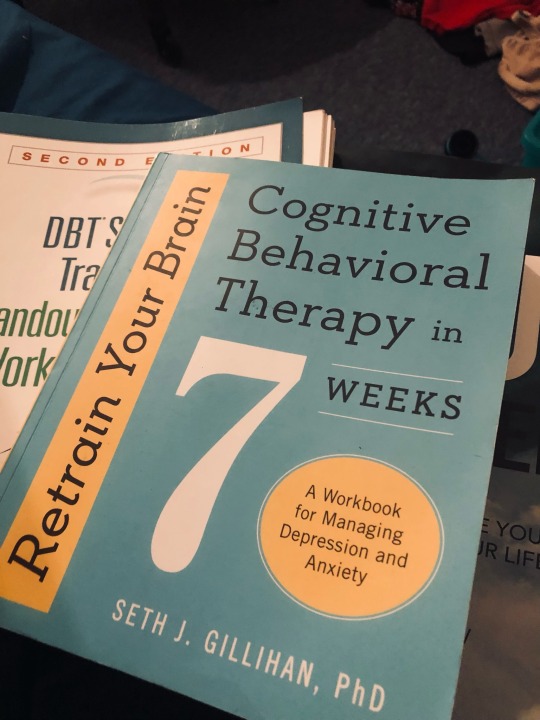
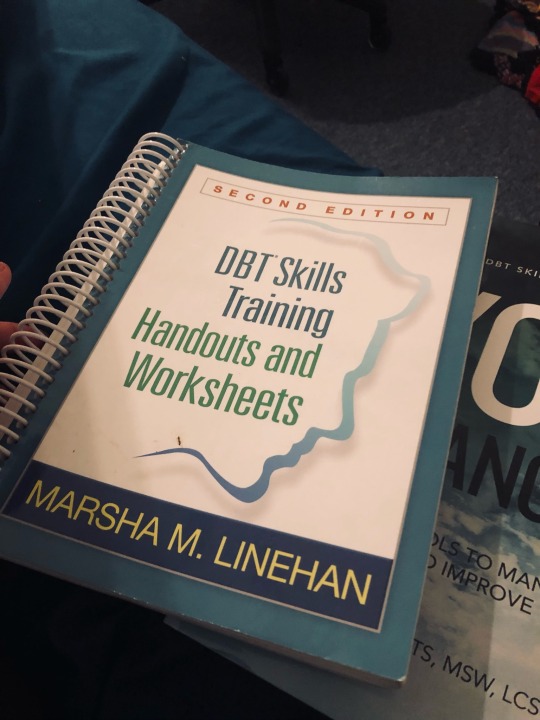

#dbt#dbt therapy#dbt skills#dbt group#dbt workbook#repost#newbedford#newbedfordguide#newbedfordma#newbedfordharbor#newbedfordmass#youtube#capecod#halloween#christmas#newengland#recovery#autumn#vegan#capecodinsta#capecodlife#truth#love#kat shares stuff#capecodinstagram
2 notes
·
View notes
Text
I feel so lonely and Dbt is not helping.
Let me explain, Dbt is centered around allistic people so, so many of the inter personal effective skills are saying to control your body language or read other peoples which is something as and autistic person I simply can’t do
Me being autistic is one of the main reasons I don’t have any friends and it feels like Dbt is just rubbing it in by essentially being like “oh? How to make new friends? Why just try being allistic!”
Or the fact that on the section on skills (from a skills book by the developer of Dbt) for when crisis is addiction some characteristics of “addict mind” are things such as “ not looking people in the eyes” and “having poor hygiene” which if your reading this far you probably know why the eye contact is isolating to any autistic people in Dbt. But even the hygiene feels isolating to me and I’m sure many others for me it’s because I am not able to shower much due to my fatigue from chronic illnesses but also because they are a huge sensory issue for me.
It’s not that Dbt can’t be helpful certain aspects of it have helped me. But there is a inherent ableism present in some of the course work the needs to be addressed!
4 notes
·
View notes